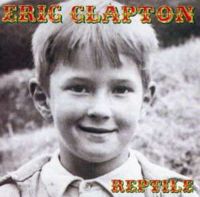 always been curiously obsessed with appearances, seemingly as interested in sartorial details and hairstyles as in the perfect guitar lick. It's hard to find two photographs of him from the 1960s and early '70s that appear to be the same person, and even after he formally launched his solo career he switched looks frequently. Thus, the album sleeve of his 13th solo studio album of new material, Reptile, its "concept" credited to the recording artist, seems significant. The album cover shows a smiling Clapton as a child, and there are family photographs on the back cover and in the booklet, along with a current photograph of the artist, who turned 56 in the weeks following the album's release, in an image that does nothing to hide the wrinkles of late middle age. This photograph faces a sleeve note by Clapton that begins with his explanation of the album title: "Where I come from, the word 'reptile' is a term of endearment, used in much the same way as 'toe rag' or 'moosh.'" (Thanks, Eric. Now, all listeners have to do is find out what "toe rag" and "moosh" mean!) The note then goes on to dedicate the album warmly to Clapton's uncle. All of this might lead you to expect an unusually personal recording from a man who has always spoken most eloquently with his guitar. If so, you'd be disappointed. Reptile seems conceived as an album to address all the disparate audiences Clapton has assembled over the years. His core audience may think of him as the premier blues guitarist of his generation, but especially as a solo artist, he has also sought a broader pop identity, and in the 1990s, with the hits "Tears in Heaven" and "Change the World," he achieved it. The fans he earned then will recognize the largely acoustic sound of such songs as "Believe in Life," "Second Nature," and "Modern Girl." But those who think of Clapton as the guy who plays "Cocaine" will be pleased with his cover of another J.J. Cale song, "Travelin' Light," and by the time the album was in record stores mainstream rock radio had already found "Superman Inside," which sounds like many of his mid-tempo rock hits of the '80s. This diversity is continued on less familiar material, especially the many interesting cover songs. Somebody, perhaps the artist himself, has been busy looking for old chestnuts, since Reptile means competing with them vocally, and as a singer Clapton isn't up to the challenge. He is assisted by the current five-man version of contains a wide variety of them: the 1930 jazz song "I Want a Little Girl," recorded by McKinney's Cotton Pickers among others; John Greer's 1952 R&B hit "Got You on My Mind"; Ray Charles' 1955 R&B hit "Come Back Baby"; James Taylor's 1972 hit "Don't Let Me Be Lonely Tonight"; and Stevie Wonder's 1980 hit "I Ain't Gonna Stand for It." The two earliest of these songs are old and obscure enough that Clapton is able to make them his own, and he recasts the Taylor song enough to re-invent it, but remaking songs by Charles and Wonderthe Impressions, who do much to shore up his vocal weaknesses, but he still isn't a disciplined or thoughtful singer. Of course, when that distinctive electric guitar sound kicks in, all is forgiven. Still, Reptile looks like an album that started out to be more ambitious than it ended up being. There may be a song here for each of the artist's constituencies (and, more important to its commercial impact, for every major radio format except talk and country), but as a whole the album doesn't add up to the statement Clapton seems to have been hoping to make.
always been curiously obsessed with appearances, seemingly as interested in sartorial details and hairstyles as in the perfect guitar lick. It's hard to find two photographs of him from the 1960s and early '70s that appear to be the same person, and even after he formally launched his solo career he switched looks frequently. Thus, the album sleeve of his 13th solo studio album of new material, Reptile, its "concept" credited to the recording artist, seems significant. The album cover shows a smiling Clapton as a child, and there are family photographs on the back cover and in the booklet, along with a current photograph of the artist, who turned 56 in the weeks following the album's release, in an image that does nothing to hide the wrinkles of late middle age. This photograph faces a sleeve note by Clapton that begins with his explanation of the album title: "Where I come from, the word 'reptile' is a term of endearment, used in much the same way as 'toe rag' or 'moosh.'" (Thanks, Eric. Now, all listeners have to do is find out what "toe rag" and "moosh" mean!) The note then goes on to dedicate the album warmly to Clapton's uncle. All of this might lead you to expect an unusually personal recording from a man who has always spoken most eloquently with his guitar. If so, you'd be disappointed. Reptile seems conceived as an album to address all the disparate audiences Clapton has assembled over the years. His core audience may think of him as the premier blues guitarist of his generation, but especially as a solo artist, he has also sought a broader pop identity, and in the 1990s, with the hits "Tears in Heaven" and "Change the World," he achieved it. The fans he earned then will recognize the largely acoustic sound of such songs as "Believe in Life," "Second Nature," and "Modern Girl." But those who think of Clapton as the guy who plays "Cocaine" will be pleased with his cover of another J.J. Cale song, "Travelin' Light," and by the time the album was in record stores mainstream rock radio had already found "Superman Inside," which sounds like many of his mid-tempo rock hits of the '80s. This diversity is continued on less familiar material, especially the many interesting cover songs. Somebody, perhaps the artist himself, has been busy looking for old chestnuts, since Reptile means competing with them vocally, and as a singer Clapton isn't up to the challenge. He is assisted by the current five-man version of contains a wide variety of them: the 1930 jazz song "I Want a Little Girl," recorded by McKinney's Cotton Pickers among others; John Greer's 1952 R&B hit "Got You on My Mind"; Ray Charles' 1955 R&B hit "Come Back Baby"; James Taylor's 1972 hit "Don't Let Me Be Lonely Tonight"; and Stevie Wonder's 1980 hit "I Ain't Gonna Stand for It." The two earliest of these songs are old and obscure enough that Clapton is able to make them his own, and he recasts the Taylor song enough to re-invent it, but remaking songs by Charles and Wonderthe Impressions, who do much to shore up his vocal weaknesses, but he still isn't a disciplined or thoughtful singer. Of course, when that distinctive electric guitar sound kicks in, all is forgiven. Still, Reptile looks like an album that started out to be more ambitious than it ended up being. There may be a song here for each of the artist's constituencies (and, more important to its commercial impact, for every major radio format except talk and country), but as a whole the album doesn't add up to the statement Clapton seems to have been hoping to make.
Saturday, October 15, 2005
Eric Clapton - Reptile
 always been curiously obsessed with appearances, seemingly as interested in sartorial details and hairstyles as in the perfect guitar lick. It's hard to find two photographs of him from the 1960s and early '70s that appear to be the same person, and even after he formally launched his solo career he switched looks frequently. Thus, the album sleeve of his 13th solo studio album of new material, Reptile, its "concept" credited to the recording artist, seems significant. The album cover shows a smiling Clapton as a child, and there are family photographs on the back cover and in the booklet, along with a current photograph of the artist, who turned 56 in the weeks following the album's release, in an image that does nothing to hide the wrinkles of late middle age. This photograph faces a sleeve note by Clapton that begins with his explanation of the album title: "Where I come from, the word 'reptile' is a term of endearment, used in much the same way as 'toe rag' or 'moosh.'" (Thanks, Eric. Now, all listeners have to do is find out what "toe rag" and "moosh" mean!) The note then goes on to dedicate the album warmly to Clapton's uncle. All of this might lead you to expect an unusually personal recording from a man who has always spoken most eloquently with his guitar. If so, you'd be disappointed. Reptile seems conceived as an album to address all the disparate audiences Clapton has assembled over the years. His core audience may think of him as the premier blues guitarist of his generation, but especially as a solo artist, he has also sought a broader pop identity, and in the 1990s, with the hits "Tears in Heaven" and "Change the World," he achieved it. The fans he earned then will recognize the largely acoustic sound of such songs as "Believe in Life," "Second Nature," and "Modern Girl." But those who think of Clapton as the guy who plays "Cocaine" will be pleased with his cover of another J.J. Cale song, "Travelin' Light," and by the time the album was in record stores mainstream rock radio had already found "Superman Inside," which sounds like many of his mid-tempo rock hits of the '80s. This diversity is continued on less familiar material, especially the many interesting cover songs. Somebody, perhaps the artist himself, has been busy looking for old chestnuts, since Reptile means competing with them vocally, and as a singer Clapton isn't up to the challenge. He is assisted by the current five-man version of contains a wide variety of them: the 1930 jazz song "I Want a Little Girl," recorded by McKinney's Cotton Pickers among others; John Greer's 1952 R&B hit "Got You on My Mind"; Ray Charles' 1955 R&B hit "Come Back Baby"; James Taylor's 1972 hit "Don't Let Me Be Lonely Tonight"; and Stevie Wonder's 1980 hit "I Ain't Gonna Stand for It." The two earliest of these songs are old and obscure enough that Clapton is able to make them his own, and he recasts the Taylor song enough to re-invent it, but remaking songs by Charles and Wonderthe Impressions, who do much to shore up his vocal weaknesses, but he still isn't a disciplined or thoughtful singer. Of course, when that distinctive electric guitar sound kicks in, all is forgiven. Still, Reptile looks like an album that started out to be more ambitious than it ended up being. There may be a song here for each of the artist's constituencies (and, more important to its commercial impact, for every major radio format except talk and country), but as a whole the album doesn't add up to the statement Clapton seems to have been hoping to make.
always been curiously obsessed with appearances, seemingly as interested in sartorial details and hairstyles as in the perfect guitar lick. It's hard to find two photographs of him from the 1960s and early '70s that appear to be the same person, and even after he formally launched his solo career he switched looks frequently. Thus, the album sleeve of his 13th solo studio album of new material, Reptile, its "concept" credited to the recording artist, seems significant. The album cover shows a smiling Clapton as a child, and there are family photographs on the back cover and in the booklet, along with a current photograph of the artist, who turned 56 in the weeks following the album's release, in an image that does nothing to hide the wrinkles of late middle age. This photograph faces a sleeve note by Clapton that begins with his explanation of the album title: "Where I come from, the word 'reptile' is a term of endearment, used in much the same way as 'toe rag' or 'moosh.'" (Thanks, Eric. Now, all listeners have to do is find out what "toe rag" and "moosh" mean!) The note then goes on to dedicate the album warmly to Clapton's uncle. All of this might lead you to expect an unusually personal recording from a man who has always spoken most eloquently with his guitar. If so, you'd be disappointed. Reptile seems conceived as an album to address all the disparate audiences Clapton has assembled over the years. His core audience may think of him as the premier blues guitarist of his generation, but especially as a solo artist, he has also sought a broader pop identity, and in the 1990s, with the hits "Tears in Heaven" and "Change the World," he achieved it. The fans he earned then will recognize the largely acoustic sound of such songs as "Believe in Life," "Second Nature," and "Modern Girl." But those who think of Clapton as the guy who plays "Cocaine" will be pleased with his cover of another J.J. Cale song, "Travelin' Light," and by the time the album was in record stores mainstream rock radio had already found "Superman Inside," which sounds like many of his mid-tempo rock hits of the '80s. This diversity is continued on less familiar material, especially the many interesting cover songs. Somebody, perhaps the artist himself, has been busy looking for old chestnuts, since Reptile means competing with them vocally, and as a singer Clapton isn't up to the challenge. He is assisted by the current five-man version of contains a wide variety of them: the 1930 jazz song "I Want a Little Girl," recorded by McKinney's Cotton Pickers among others; John Greer's 1952 R&B hit "Got You on My Mind"; Ray Charles' 1955 R&B hit "Come Back Baby"; James Taylor's 1972 hit "Don't Let Me Be Lonely Tonight"; and Stevie Wonder's 1980 hit "I Ain't Gonna Stand for It." The two earliest of these songs are old and obscure enough that Clapton is able to make them his own, and he recasts the Taylor song enough to re-invent it, but remaking songs by Charles and Wonderthe Impressions, who do much to shore up his vocal weaknesses, but he still isn't a disciplined or thoughtful singer. Of course, when that distinctive electric guitar sound kicks in, all is forgiven. Still, Reptile looks like an album that started out to be more ambitious than it ended up being. There may be a song here for each of the artist's constituencies (and, more important to its commercial impact, for every major radio format except talk and country), but as a whole the album doesn't add up to the statement Clapton seems to have been hoping to make.
Friday, October 14, 2005
Eric Clapton & BB King - Riding With The King
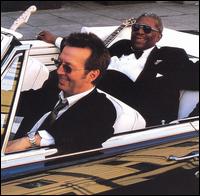 Clapton is enormous, of course, and the real questions concern how it is organized and executed. This first recorded pairing between the 74-year-old King and the 55-year-old Clapton was put together in the most obvious way: Clapton arranged the session using many of his regular musicians, picked the songs, and co-produced with his partner Simon Climie. That ought to mean that King would be a virtual guest star rather than earning a co-billing, but because of Clapton's respect for his elder, it nearly works the other way around. The set list includes lots of King specialties -- "Ten Long Years," "Three O'Clock Blues," "Days of Old," "When My Heart Beats Like a Hammer" -- as well as standards like "Hold on I'm Coming" and "Come Rain or Come Shine," with some specially written and appropriate recent material thrown in, so King has reason to be comfortable without being complacent. The real danger is that Clapton will defer too much; though he can be inspired by a competing guitarist such as Duane Allman, he has sometimes tended to lean too heavily on accompanists such as Albert Lee and Mark Knopfler when working with them in concert. That danger is partially realized; as its title indicates, Riding With the King than it is about Clapton. But the two players turn out to have sufficiently complementary, if distinct, styles so that Clapton's supportive role fills out and surrounds is more about KingKing's stinging single-string playing. (It's also worth noting that there are usually another two or three guitarists on each track.) The result is an effective, if never really stunning, work.
Clapton is enormous, of course, and the real questions concern how it is organized and executed. This first recorded pairing between the 74-year-old King and the 55-year-old Clapton was put together in the most obvious way: Clapton arranged the session using many of his regular musicians, picked the songs, and co-produced with his partner Simon Climie. That ought to mean that King would be a virtual guest star rather than earning a co-billing, but because of Clapton's respect for his elder, it nearly works the other way around. The set list includes lots of King specialties -- "Ten Long Years," "Three O'Clock Blues," "Days of Old," "When My Heart Beats Like a Hammer" -- as well as standards like "Hold on I'm Coming" and "Come Rain or Come Shine," with some specially written and appropriate recent material thrown in, so King has reason to be comfortable without being complacent. The real danger is that Clapton will defer too much; though he can be inspired by a competing guitarist such as Duane Allman, he has sometimes tended to lean too heavily on accompanists such as Albert Lee and Mark Knopfler when working with them in concert. That danger is partially realized; as its title indicates, Riding With the King than it is about Clapton. But the two players turn out to have sufficiently complementary, if distinct, styles so that Clapton's supportive role fills out and surrounds is more about KingKing's stinging single-string playing. (It's also worth noting that there are usually another two or three guitarists on each track.) The result is an effective, if never really stunning, work.
Thursday, October 13, 2005
Eric Clapton - Pilgrim
 almost entirely on covers and new versions of classic hits; he released no albums of new material between 1989's Journeyman and 1998's Pilgrim. In the decade between the two albums, he had two new hits -- his moving elegy to his deceased son, "Tears in Heaven," and the slick contemporary soul of the Babyface-written "Change the World" -- and Pilgrim tries to reach a middle ground between these two extremes, balancing tortured lyrics with smooth sonic surfaces. Working with producer Simon Climie, his collaborator on the TDF side project, Clapton has created a numbingly calm record that, for all of its lyrical torment, displays no emotion whatsoever. Much of the problem lies in the production, which relies entirely on stiff mechanical drumbeats, gauzy synthesizers, and meandering instrumental interludes. These ingredients could result in a good record, as "Change the World" demonstrated, but not here, due to Pilgrim's monotonous production. Unfortunately, Clapton doesn't want to shake things up -- his singing is startlingly mannered, even on emotionally turbulent numbers like "My Father's Eyes" or "Circus." Even worse, he's content to take a back seat instrumentally, playing slight solos and fills as colorless as the electronic backdrops. The deadened sonics would make Pilgrim a chore even if there were strong songs on the record, but only a handful of tunes break through the murk. Considering that Journeyman, his last album of original material, was a fine workmanlike effort and that From the Cradle and Unplugged crackled with vitality, the blandness of Pilgrim is all the more disappointing.
almost entirely on covers and new versions of classic hits; he released no albums of new material between 1989's Journeyman and 1998's Pilgrim. In the decade between the two albums, he had two new hits -- his moving elegy to his deceased son, "Tears in Heaven," and the slick contemporary soul of the Babyface-written "Change the World" -- and Pilgrim tries to reach a middle ground between these two extremes, balancing tortured lyrics with smooth sonic surfaces. Working with producer Simon Climie, his collaborator on the TDF side project, Clapton has created a numbingly calm record that, for all of its lyrical torment, displays no emotion whatsoever. Much of the problem lies in the production, which relies entirely on stiff mechanical drumbeats, gauzy synthesizers, and meandering instrumental interludes. These ingredients could result in a good record, as "Change the World" demonstrated, but not here, due to Pilgrim's monotonous production. Unfortunately, Clapton doesn't want to shake things up -- his singing is startlingly mannered, even on emotionally turbulent numbers like "My Father's Eyes" or "Circus." Even worse, he's content to take a back seat instrumentally, playing slight solos and fills as colorless as the electronic backdrops. The deadened sonics would make Pilgrim a chore even if there were strong songs on the record, but only a handful of tunes break through the murk. Considering that Journeyman, his last album of original material, was a fine workmanlike effort and that From the Cradle and Unplugged crackled with vitality, the blandness of Pilgrim is all the more disappointing.
Eric Clapton - Behind The Sun
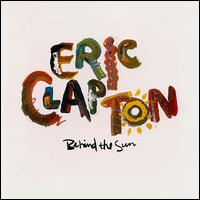 switched record labels from Polydor to Warner Bros., and his debut Warner album, Money and Cigarettes, became his first to fall below gold-record status in more than six years. As a result, Warner looked critically at his follow-up, the Phil Collins-produced Behind the Sun, in the fall of 1984 and rejected the first version submitted, insisting that he record several new songs written by Jerry Williams, backed by Los Angeles session players under the auspices of company producers Lenny Waronker and Ted Templeman. Warner then emphasized the new tracks, releasing two of them, "Forever Man" (which reached the Top 40) and "See What Love Can Do," as singles. The resulting album, not surprisingly, was somewhat schizophrenic, though the company may have been correct in thinking that the album as a whole was competent without being very exciting. The added tracks were not bad, but they were not the sure-fire hits they were supposed to be. As usual, there was some effective guitar soloing (notably on "Same Old Blues"), but despite the tinkering, Behind the Sun was not one of Clapton's better albums.
switched record labels from Polydor to Warner Bros., and his debut Warner album, Money and Cigarettes, became his first to fall below gold-record status in more than six years. As a result, Warner looked critically at his follow-up, the Phil Collins-produced Behind the Sun, in the fall of 1984 and rejected the first version submitted, insisting that he record several new songs written by Jerry Williams, backed by Los Angeles session players under the auspices of company producers Lenny Waronker and Ted Templeman. Warner then emphasized the new tracks, releasing two of them, "Forever Man" (which reached the Top 40) and "See What Love Can Do," as singles. The resulting album, not surprisingly, was somewhat schizophrenic, though the company may have been correct in thinking that the album as a whole was competent without being very exciting. The added tracks were not bad, but they were not the sure-fire hits they were supposed to be. As usual, there was some effective guitar soloing (notably on "Same Old Blues"), but despite the tinkering, Behind the Sun was not one of Clapton's better albums.
Wednesday, October 12, 2005
Eric Clapton - Unplugged
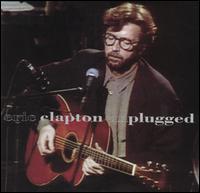
Eric Clapton's Unplugged was responsible for making acoustic-based music, and Unplugged albums in particular, a hot trend in the early '90s. Clapton's concert was not only one of the finest Unplugged episodes, but was also some of the finest music he had recorded in years. Instead of the slick productions that tainted his '80s albums, the music was straightforward and direct, alternating between his pop numbers and traditional blues songs. The result was some of the most genuine, heartfelt music the guitarist has ever committed to tape. And some of his most popular -- the album sold over seven million copies in the U.S. and won several Grammies.
Tuesday, October 11, 2005
Jefferson Airplane - Surrealistic Pillow
 groundbreaking piece of folk-rock-based psychedelia, and it hit -- literally -- like a shot heard round the world; where the later efforts from bands like the Grateful Dead, Quicksilver Messenger Service, and especially, the Charlatans, were initially not too much more than cult successes, Surrealistic Pillow rode the pop charts for most of 1967, soaring into that rarefied Top Five region occupied by the likes of the Beatles, the Rolling Stones, and so on, to which few American rock acts apart from the Byrds had been able to lay claim since 1964. And decades later the album still comes off as strong as any of those artists' best work. From the Top Ten singles "White Rabbit" and "Somebody to Love" to the sublime "Embryonic Journey," the sensibilities are fierce, the material manages to be both melodic and complex (and it rocks, too), and the performances, sparked by new member Grace Slick on most of the lead vocals, are inspired, helped along by Jerry Garcia (serving as spiritual and musical advisor and sometimes guitarist). Every song is a perfectly cut diamond, too perfect in the eyes of the bandmembers, who felt that following the direction of producer Rick Jarrard and working within three- and four-minute running times, and delivering carefully sung accompaniments and succinct solos, resulted in a record that didn't represent their real sound. Regardless, they did wonderful things with the music within that framework, and the only pity is that RCA didn't record for official release any of the group's shows from the same era, when this material made up the bulk of their repertory. That way the live versions, with the band's creativity unrestricted, could be compared and contrasted with the record. The songwriting was spread around between Marty Balin, Slick, Paul Kantner, and Jorma Kaukonen, and Slick and Balin (who never had a prettier song than "Today," which he'd actually written for Tony Bennett) shared the vocals; the whole album was resplendent in a happy balance of all of these creative elements, before excessive experimentation (musical and chemical) began affecting the band's ability to do a straightforward song. The group never made a better album, and few artists from the era ever did.
groundbreaking piece of folk-rock-based psychedelia, and it hit -- literally -- like a shot heard round the world; where the later efforts from bands like the Grateful Dead, Quicksilver Messenger Service, and especially, the Charlatans, were initially not too much more than cult successes, Surrealistic Pillow rode the pop charts for most of 1967, soaring into that rarefied Top Five region occupied by the likes of the Beatles, the Rolling Stones, and so on, to which few American rock acts apart from the Byrds had been able to lay claim since 1964. And decades later the album still comes off as strong as any of those artists' best work. From the Top Ten singles "White Rabbit" and "Somebody to Love" to the sublime "Embryonic Journey," the sensibilities are fierce, the material manages to be both melodic and complex (and it rocks, too), and the performances, sparked by new member Grace Slick on most of the lead vocals, are inspired, helped along by Jerry Garcia (serving as spiritual and musical advisor and sometimes guitarist). Every song is a perfectly cut diamond, too perfect in the eyes of the bandmembers, who felt that following the direction of producer Rick Jarrard and working within three- and four-minute running times, and delivering carefully sung accompaniments and succinct solos, resulted in a record that didn't represent their real sound. Regardless, they did wonderful things with the music within that framework, and the only pity is that RCA didn't record for official release any of the group's shows from the same era, when this material made up the bulk of their repertory. That way the live versions, with the band's creativity unrestricted, could be compared and contrasted with the record. The songwriting was spread around between Marty Balin, Slick, Paul Kantner, and Jorma Kaukonen, and Slick and Balin (who never had a prettier song than "Today," which he'd actually written for Tony Bennett) shared the vocals; the whole album was resplendent in a happy balance of all of these creative elements, before excessive experimentation (musical and chemical) began affecting the band's ability to do a straightforward song. The group never made a better album, and few artists from the era ever did.
Mazzy Star - She Hangs Brightly
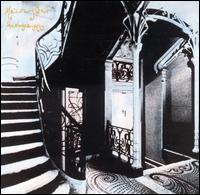 Happy Nightmare Baby left off; merely exchanging Kendra Smith's languorous vocals for the more sultry presence of Hope Sandoval, David Roback continues chasing the neo-psychedelic holy grail he's pursued since his days with the Rain Parade, albeit with mixed success here. After opening with a pair of standouts, the dreamy "Halah" and the garage-inspired "Blue Flower," the album quickly loses focus, and even the group's solid grasp of atmosphere and texture can't overcome the songs' distinctly unmemorable melodies.
Happy Nightmare Baby left off; merely exchanging Kendra Smith's languorous vocals for the more sultry presence of Hope Sandoval, David Roback continues chasing the neo-psychedelic holy grail he's pursued since his days with the Rain Parade, albeit with mixed success here. After opening with a pair of standouts, the dreamy "Halah" and the garage-inspired "Blue Flower," the album quickly loses focus, and even the group's solid grasp of atmosphere and texture can't overcome the songs' distinctly unmemorable melodies.If psychedelic music had a voice in '90s post-punk, Mazzy Star may have been its strongest reincarnation. That doesn't necessarily mean that fans of the Jefferson Airplane and the Grateful Dead will find the band to their liking, however. Mazzy Star much prefered the dark side of psychedelia, as exemplified by the most distended tracks of the Doors and the Velvet Underground. Their fuzzy guitar workouts and plaintive folky compositions are often suffused in a dissociative ennui that is very much of the 1990s, however much their textures may recall the drug-induced states of vintage psychedelia.
Monday, October 10, 2005
Eric Clapton - 24 Nights
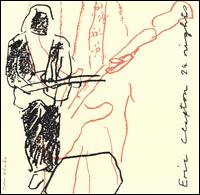 several good reasons to release one in the early '90s. For one thing, his spare backup band of keyboardist Greg Phillinganes, bassist Nathan East, and drummer Steve Ferrone, was his best live unit ever, and its powerful live versions of Cream classics like "White Room" and "Sunshine of Your Love" deserved to be documented. For another, since 1987, Clapton had been playing an annual series of concerts at the Royal Albert Hall in London, putting together various special shows -- blues nights, orchestral nights, etc. 24 Nights, a double album, was culled from two years of such shows, 1990 and 1991, and it demonstrated the breadth of Clapton's work, from his hot regular band to assemblages of bluesmen like Buddy Guy and Robert Cray to examples of his soundtrack work with an orchestra led by Michael Kamen. The result was an album that came across as a lavishly constructed retrospective and a testament to Clapton's musical stature. But it made little impact upon release (though it quickly went gold), perhaps because events overcame it -- three months later, Clapton's elegy for his baby son, "Tears In Heaven," was all over the radio, and a few months after that he was redefining himself on MTV Unplugged -- a live show as austere as 24 Nights was grand. Still, it would be hard to find a more thorough demonstration of Clapton's abilities than the one presented here.
several good reasons to release one in the early '90s. For one thing, his spare backup band of keyboardist Greg Phillinganes, bassist Nathan East, and drummer Steve Ferrone, was his best live unit ever, and its powerful live versions of Cream classics like "White Room" and "Sunshine of Your Love" deserved to be documented. For another, since 1987, Clapton had been playing an annual series of concerts at the Royal Albert Hall in London, putting together various special shows -- blues nights, orchestral nights, etc. 24 Nights, a double album, was culled from two years of such shows, 1990 and 1991, and it demonstrated the breadth of Clapton's work, from his hot regular band to assemblages of bluesmen like Buddy Guy and Robert Cray to examples of his soundtrack work with an orchestra led by Michael Kamen. The result was an album that came across as a lavishly constructed retrospective and a testament to Clapton's musical stature. But it made little impact upon release (though it quickly went gold), perhaps because events overcame it -- three months later, Clapton's elegy for his baby son, "Tears In Heaven," was all over the radio, and a few months after that he was redefining himself on MTV Unplugged -- a live show as austere as 24 Nights was grand. Still, it would be hard to find a more thorough demonstration of Clapton's abilities than the one presented here.
Marianne Faithfull - Broken English
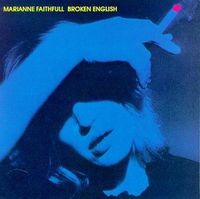 in 1979. It is considered by many commentators to be the singer’s definitive recording, whilst Faithfull herself describes it in her autobiography as "the masterpiece". Containing some of her most famous songs, including the title track and "The Ballad of Lucy Jordan", the album was also notable for the controversy surrounding the final number "Why D’Ya Do It?".
in 1979. It is considered by many commentators to be the singer’s definitive recording, whilst Faithfull herself describes it in her autobiography as "the masterpiece". Containing some of her most famous songs, including the title track and "The Ballad of Lucy Jordan", the album was also notable for the controversy surrounding the final number "Why D’Ya Do It?". Faithfull’s immediately preceding albums, Dreaming My Dreams and Faithless (which in fact shared some tracks), had been in a relatively gentle folk or country and western style. The music on the new album was a far more contemporary fusion of rock, punk, new wave and dance, with liberal use of synthesizers. Critics also noted that Faithfull’s voice, after a number of years of drug abuse, had a lower register and a more world-weary quality than in the past, well suited to the often raw emotions expressed in the songs.
The album’s title track took inspiration from terrorist figures of the time, particularly Ulrike Meinhof of the Baader-Meinhof group. "Guilt" was informed by the Catholic upbringing of the singer and her composer Barry Reynolds. "The Ballad of Lucy Jordan", originally performed by Dr Hook, was a melancholy tale of middle class disillusionment; Faithfull's version became something of anthem and was used to appropriate effect on the soundtracks to the films Montenegro (1981) and Thelma and Louise (1991). "What’s the Hurry?" was described by Faithfull as reflecting the everyday desperation of the habitual drug user. Her cover of John Lennon’s "Working Class Hero", recorded as a tribute to her own heroes such as Mick Jagger and Keith Richards, David Bowie and Iggy Pop, and Lennon himself, was widely praised.
The last track, "Why D’Ya Do It?", was a caustic response to a lover’s betrayal set to a grinding tune inspired by Jimi Hendrix’s recording of Bob Dylan’s "All Along the Watchtower". Writer Heathcote Williams had originally intended the lyric for Tina Turner but Faithfull succeeded in convincing him that Turner would never record such a number. Its plethora of four-letter words and explicit references to oral sex caused controversy and led to a ban in Australia, where local pressings of the LP were released with smooth vinyl in place of the track and a 'bonus' 45 single as compensation (the ban did not extend to import copies). Whilst the song’s notoriety arguably guaranteed a favourable reception from contemporary critics, reappraisals over the years still tend to regard it as one of the album’s highlights.
The Official Website of Marianne Faithfull
Sunday, October 09, 2005
Eric Clapton - August
 August, employing a stripped-down band featuring keyboard player Greg Phillinganes, bassist Nathan East, and drummer/producer Phil Collins, plus, on several tracks, a horn section and, on a couple of tracks, backup vocals by Tina Turner, and performing songs written by old Motown hand Lamont Dozier, among others. The excellent, but incongruous, leadoff track, however, was "It's in the Way That You Use It," which Clapton and Robbie Robertson had written for Robertson's score to the film The Color of Money. Elsewhere, Clapton sang and played fiercely on songs like "Tearing Us Apart," "Run," and "Miss You," all of which earned AOR radio play. That radio support may have helped the album to achieve gold status in less than six months, Clapton's best commercial showing since 1981's Another Ticket, despite the album's failure to generate a hit single. The title commemorates the birth in August 1986 of Clapton's son Conor.
August, employing a stripped-down band featuring keyboard player Greg Phillinganes, bassist Nathan East, and drummer/producer Phil Collins, plus, on several tracks, a horn section and, on a couple of tracks, backup vocals by Tina Turner, and performing songs written by old Motown hand Lamont Dozier, among others. The excellent, but incongruous, leadoff track, however, was "It's in the Way That You Use It," which Clapton and Robbie Robertson had written for Robertson's score to the film The Color of Money. Elsewhere, Clapton sang and played fiercely on songs like "Tearing Us Apart," "Run," and "Miss You," all of which earned AOR radio play. That radio support may have helped the album to achieve gold status in less than six months, Clapton's best commercial showing since 1981's Another Ticket, despite the album's failure to generate a hit single. The title commemorates the birth in August 1986 of Clapton's son Conor.
Saturday, October 08, 2005
Eric Clapton - E.C. Was Here
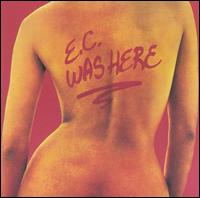 subsequent comeback (announced by 461 Ocean Boulevard), the guitar legend retained his fine band and toured extensively, and this live album is a souvenir of that period. Despite having such pop-oriented hits as "I Shot the Sheriff," E.C. Was Here makes it clear that Clapton was and always would be a blues man. The opening cut, "Have You Ever Loved a Woman," clearly illustrates this, and underlines the fact that Clapton had a firm grasp on his blues guitar ability, with some sterling, emotionally charged and sustained lines and riffs. A short version of "Drifting Blues" also drives the point home, with a lazy, Delta blues feel that is intoxicating. Aside from these standout blues workouts, Clapton provides a surprise with two songs from his Blind Faith period. "Presence of the Lord" and Steve Winwood's classic "Can't Find My Way Home" are given great readings here and highlight Clapton's fine touring band, particularly co-vocalist Yvonne Elliman, whose singing adds a mellifluousness to Clapton's blues vocal inflections. The market was a bit oversaturated with Clapton and Cream reissue products at the time, and this fine record got lost in the shuffle, but it remains an excellent document of the period.
subsequent comeback (announced by 461 Ocean Boulevard), the guitar legend retained his fine band and toured extensively, and this live album is a souvenir of that period. Despite having such pop-oriented hits as "I Shot the Sheriff," E.C. Was Here makes it clear that Clapton was and always would be a blues man. The opening cut, "Have You Ever Loved a Woman," clearly illustrates this, and underlines the fact that Clapton had a firm grasp on his blues guitar ability, with some sterling, emotionally charged and sustained lines and riffs. A short version of "Drifting Blues" also drives the point home, with a lazy, Delta blues feel that is intoxicating. Aside from these standout blues workouts, Clapton provides a surprise with two songs from his Blind Faith period. "Presence of the Lord" and Steve Winwood's classic "Can't Find My Way Home" are given great readings here and highlight Clapton's fine touring band, particularly co-vocalist Yvonne Elliman, whose singing adds a mellifluousness to Clapton's blues vocal inflections. The market was a bit oversaturated with Clapton and Cream reissue products at the time, and this fine record got lost in the shuffle, but it remains an excellent document of the period.
Friday, October 07, 2005
Eric Clapton - Another Ticket
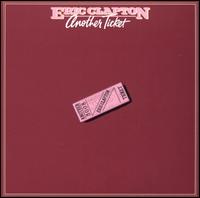 version of it, produced by Glyn Johns, and Eric Clapton was forced to cut it all over again with Tom Dowd. Then, a few dates into a U.S. promotional tour coinciding with its release, Clapton collapsed and was found to be near death from ulcers due to his alcoholism. Finally, it turned out to be the final record of his 15-year association with Polydor, which therefore had no reason to promote it. Nevertheless, the album made the Top Ten, went gold, and spawned a Top Ten single in "I Can't Stand It." And the rest of it wasn't too shabby, either. The first and last Clapton studio album to feature his all-British band of the early '80s, it gave considerable prominence to second guitarist Albert Lee and especially to keyboard player/singer Gary Brooker (formerly leader of Procol Harum), and they gave it more of a blues-rock feel than the country-funk brewed up by the Tulsa shuffle crew Clapton had used throughout the 1970s. Best of all, Clapton had taken the time to write some songs -- he's credited on six of the nine selections -- and tunes such as the title track and "I Can't Stand It" held up well. This wasn't great Clapton, but it was good, and it deserved more recognition than conditions allowed it at the time.
version of it, produced by Glyn Johns, and Eric Clapton was forced to cut it all over again with Tom Dowd. Then, a few dates into a U.S. promotional tour coinciding with its release, Clapton collapsed and was found to be near death from ulcers due to his alcoholism. Finally, it turned out to be the final record of his 15-year association with Polydor, which therefore had no reason to promote it. Nevertheless, the album made the Top Ten, went gold, and spawned a Top Ten single in "I Can't Stand It." And the rest of it wasn't too shabby, either. The first and last Clapton studio album to feature his all-British band of the early '80s, it gave considerable prominence to second guitarist Albert Lee and especially to keyboard player/singer Gary Brooker (formerly leader of Procol Harum), and they gave it more of a blues-rock feel than the country-funk brewed up by the Tulsa shuffle crew Clapton had used throughout the 1970s. Best of all, Clapton had taken the time to write some songs -- he's credited on six of the nine selections -- and tunes such as the title track and "I Can't Stand It" held up well. This wasn't great Clapton, but it was good, and it deserved more recognition than conditions allowed it at the time.
Concrete Blonde - Mexican Moon
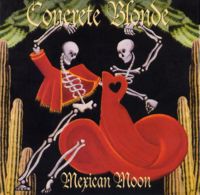 highlights are generally regarded to be the opening two tracks, "Jenny I Read," which details the rise to stardom and subsequent fall into happy obscurity of a fashion model (rumoured to be Bettie Page), and "Mexican Moon," which finds lead singer Johnette Napolitano fleeing a failed romance into México. In accordance with the band's musical stylings on their previous album, the music on Mexican Moon is jagged and brooding, taking the gothic rock of their previous albums and adding more of a hard rock edge to it. Napolitano provided the vocals, bass guitar, samples, and the album artwork, and she was accompanied by drummer Paul Thompson and guitarist James Mankey.
highlights are generally regarded to be the opening two tracks, "Jenny I Read," which details the rise to stardom and subsequent fall into happy obscurity of a fashion model (rumoured to be Bettie Page), and "Mexican Moon," which finds lead singer Johnette Napolitano fleeing a failed romance into México. In accordance with the band's musical stylings on their previous album, the music on Mexican Moon is jagged and brooding, taking the gothic rock of their previous albums and adding more of a hard rock edge to it. Napolitano provided the vocals, bass guitar, samples, and the album artwork, and she was accompanied by drummer Paul Thompson and guitarist James Mankey. The song "Jonestown" is a scathing critique of the theology surrounding the Jonestown Massacre and opens with a minute-long sample of Jim Jones ranting about warfare. "End of the Line" is a cover song, having been originally recorded by Brian Ferry. The closing track, "Bajo la Lune Mexicana," is something of a travesty. Napolitano, who does not speak Spanish, wrote the Spanish lyrics, which are a literal translation of the lyrics to the album's title track. However, none of the verbs are conjugated, noun gender is ignored, and correct grammar is non-existent. It was as if Napolitano simply ran the lyrics to "Mexican Moon" through an English-Spanish dictionary one word at a time and then sung them that way. Fans usually ignore the track, and Spanish speakers find it laughable.
Though the first two songs are fan favourites, neither were included on The Essential, a Concrete Blonde "greatest hits" retrospective which was released in 2005. This album produced three singles: the title track, "Heal It Up," and "Jonestown," which was released only on vinyl and contained an alternate version of the song.
Thursday, October 06, 2005
Fiona Apple - Tidal
 Apple, released by Epic Records in the United States on July 23, 1996 (see 1996 in music). It peaked at number fifteen on the U.S. Billboard 200 and as of October 2005 had sold 2.7 million copies in the U.S. according to Nielsen SoundScan.[1] It was certified gold by the RIAA in December 1996, platinum in July 1997, two times platinum the following October and three times platinum in April 1999. Tidal produced six singles: "Shadowboxer", "Slow Like Honey","Sleep to Dream", "The First Taste", "Criminal" and "Never Is a Promise". "Criminal", the album's most popular single, won a 1998 Grammy Award for "Best Female Rock Vocal Performance" and was named the single of 1997 in a poll of Rolling Stone readers.The music video for "The First Taste" never aired in the U.S.
Apple, released by Epic Records in the United States on July 23, 1996 (see 1996 in music). It peaked at number fifteen on the U.S. Billboard 200 and as of October 2005 had sold 2.7 million copies in the U.S. according to Nielsen SoundScan.[1] It was certified gold by the RIAA in December 1996, platinum in July 1997, two times platinum the following October and three times platinum in April 1999. Tidal produced six singles: "Shadowboxer", "Slow Like Honey","Sleep to Dream", "The First Taste", "Criminal" and "Never Is a Promise". "Criminal", the album's most popular single, won a 1998 Grammy Award for "Best Female Rock Vocal Performance" and was named the single of 1997 in a poll of Rolling Stone readers.The music video for "The First Taste" never aired in the U.S.
Wednesday, October 05, 2005
Eric Clapton - Slowhand
 much of an impact commerically, Eric Clapton returned to using his own band for Slowhand. The difference is substantial -- where No Reason to Cry struggled hard to find the right tone, Slowhand opens with the relaxed, bluesy shuffle of J.J. Cale's "Cocaine" and sustains it throughout the course of the album. Alternating between straight blues ("Mean Old Frisco"), country ("Lay Down Sally"), mainstream rock ("Cocaine," "The Core"), and pop ("Wonderful Tonight"), Slowhand doesn't sound schizophrenic because of the band's grasp of the material. This is laid-back virtuosity -- although Clapton and his band are never flashy, their playing is masterful and assured. That assurance and the album's eclectic material make Slowhand rank with 461 Ocean Boulevard as Eric Clapton's best albums.
much of an impact commerically, Eric Clapton returned to using his own band for Slowhand. The difference is substantial -- where No Reason to Cry struggled hard to find the right tone, Slowhand opens with the relaxed, bluesy shuffle of J.J. Cale's "Cocaine" and sustains it throughout the course of the album. Alternating between straight blues ("Mean Old Frisco"), country ("Lay Down Sally"), mainstream rock ("Cocaine," "The Core"), and pop ("Wonderful Tonight"), Slowhand doesn't sound schizophrenic because of the band's grasp of the material. This is laid-back virtuosity -- although Clapton and his band are never flashy, their playing is masterful and assured. That assurance and the album's eclectic material make Slowhand rank with 461 Ocean Boulevard as Eric Clapton's best albums.
The Very Best of Soft Cell
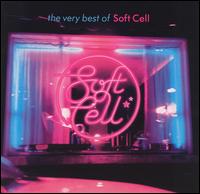 lyrics could have ever wrapped up the duel nature of Soft Cell's music better, these lines (from "Bedsitter") tells of their fun new wave club hits and their intimate electronic dirges, and the effect they both have on listeners. The true magic of the band is when they could combine the two, like on their signature song "Tainted Love." But there are plenty of excellent songs by the duo that were never praised as highly, and most of them make it to this collection of their best material. "Say Hello, Wave Goodbye" is a touching ballad that floats its lush and heavenly melodies on a bed of throbbing synthesizers and minimalist percussion. "Sex Dwarf" is a sleazy anthem that features plodding keyboards, aggressive drums, and one of the ugliest vocal performances committed to record. It isn't that Marc Almond has a death metal throat, but instead it's the way he creeps and crawls over the track like a perverted lounge singer. The sweet gloss of "Where the Heart Is" reveals a bright and energetic group using their quirky approach to shape a thoughtful pop nugget, while "Numbers" predates the Pet Shop Boys' sarcastic-yet-touching synth pop with like-minded lyrics and equally lush keyboards. There isn't a wasted moment on the album, and the documentation of a brilliant pop group deconstructing their own genre to fit their needs is quite refreshing when so much music from this time period comes off as so dated. A good song overcomes any wacky '80s keyboard work ("Soul Inside") or high-concept production techniques ("Memorabilia"), and that's the lesson to learn from this excellent collection of hidden gems.
lyrics could have ever wrapped up the duel nature of Soft Cell's music better, these lines (from "Bedsitter") tells of their fun new wave club hits and their intimate electronic dirges, and the effect they both have on listeners. The true magic of the band is when they could combine the two, like on their signature song "Tainted Love." But there are plenty of excellent songs by the duo that were never praised as highly, and most of them make it to this collection of their best material. "Say Hello, Wave Goodbye" is a touching ballad that floats its lush and heavenly melodies on a bed of throbbing synthesizers and minimalist percussion. "Sex Dwarf" is a sleazy anthem that features plodding keyboards, aggressive drums, and one of the ugliest vocal performances committed to record. It isn't that Marc Almond has a death metal throat, but instead it's the way he creeps and crawls over the track like a perverted lounge singer. The sweet gloss of "Where the Heart Is" reveals a bright and energetic group using their quirky approach to shape a thoughtful pop nugget, while "Numbers" predates the Pet Shop Boys' sarcastic-yet-touching synth pop with like-minded lyrics and equally lush keyboards. There isn't a wasted moment on the album, and the documentation of a brilliant pop group deconstructing their own genre to fit their needs is quite refreshing when so much music from this time period comes off as so dated. A good song overcomes any wacky '80s keyboard work ("Soul Inside") or high-concept production techniques ("Memorabilia"), and that's the lesson to learn from this excellent collection of hidden gems.
Tuesday, October 04, 2005
Eric Clapton - No Reason to Cry
 Hall of Fame, Eric Clapton said that after he heard their debut album, Music from Big Pink, he wanted to join the group, the fact that they already had a guitarist in Robbie Robertson notwithstanding. In the winter of 1975-1976, when he cut No Reason to Cry at the Band's Shangri-la Studio in Malibu, California, he came as close as he ever would to realizing that desire. Clapton is a musical chameleon; though some of No Reason to Cry is identifiable as the kind of pop/rock Clapton had been making since the start of his solo career (the best of it being "Hello Old Friend," which became his first Top 40 single in two years), the most memorable music on the album occurs when Clapton is collaborating with members of the Band and other guests. He duets with Band bassist Rick Danko on Danko's "All Our Past Times," and with Bob Dylan on Dylan's "Sign Language," as Robertson's distinctive lead guitar is heard rather than Clapton's. As a result, the album is a good purchase for fans of Bob Dylan and the Band, but not necessarily for those of Eric Clapton. [The CD reissue adds a bonus track, "Last Night," which is a traditional 12-bar blues song credited to Clapton.]
Hall of Fame, Eric Clapton said that after he heard their debut album, Music from Big Pink, he wanted to join the group, the fact that they already had a guitarist in Robbie Robertson notwithstanding. In the winter of 1975-1976, when he cut No Reason to Cry at the Band's Shangri-la Studio in Malibu, California, he came as close as he ever would to realizing that desire. Clapton is a musical chameleon; though some of No Reason to Cry is identifiable as the kind of pop/rock Clapton had been making since the start of his solo career (the best of it being "Hello Old Friend," which became his first Top 40 single in two years), the most memorable music on the album occurs when Clapton is collaborating with members of the Band and other guests. He duets with Band bassist Rick Danko on Danko's "All Our Past Times," and with Bob Dylan on Dylan's "Sign Language," as Robertson's distinctive lead guitar is heard rather than Clapton's. As a result, the album is a good purchase for fans of Bob Dylan and the Band, but not necessarily for those of Eric Clapton. [The CD reissue adds a bonus track, "Last Night," which is a traditional 12-bar blues song credited to Clapton.]
Soft Cell - Live - 2003
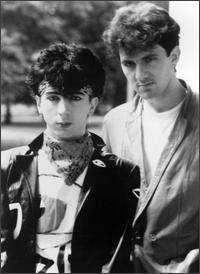
Their second album in 19 years is a live double album recorded during the bands 2003 European tour. Generally live albums are really an excuse for a greatest hits album with some crowd sing-alongs thrown in, good in their own way but meaningless unless you were there. This one is no exception although as well as the hits it does include several tracks from their 2002 album ‘Cruelty Without Beauty’.
Almond’s witty lyrics are prevalent in tracks such as ‘Caligula Syndrome’ and ‘Martin’ but it is the infamous electronic sound backing the camp dramatic tones of ‘The Art Of Falling Apart’ and ‘Heat’ that are truly Soft Cell. However the only real interest in the album apart from Almond’s orgasmic groans on ‘Sex Dwarf’ are of course the classic hits, which seem to carry the whole album. ‘Bedsitter’, the clubland favourite of the 80s, shows Almond at his humorous best, then of course there is the ubiquitous ‘Tainted Love’ and ‘Where Did Our Love Go’. The highlight though is a song that even David Gray couldn’t ruin, the great anthem ‘Say Hello Wave Goodbye’.
Monday, October 03, 2005
Eric Clapton - 461 Ocean Boulevard
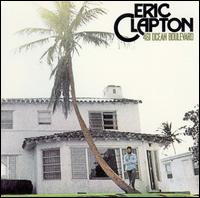 arriving after his side project of Derek and the Dominos and a long struggle with heroin addiction. Although there are some new reggae influences, the album doesn't sound all that different from the rock, pop, blues, country, and R&B amalgam of Eric Clapton. However, 461 Ocean Boulevard is a tighter, more focused outing that enables Clapton to stretch out instrumentally. Furthermore, the pop concessions on the album -- the sleek production, the concise running times -- don't detract from the rootsy origins of the material, whether it's Johnny Otis' "Willie and the Hand Jive," the traditional blues "Motherless Children," Bob Marley's "I Shot the Sheriff," or Clapton's emotional original "Let It Grow." With its relaxed, friendly atmosphere and strong bluesy roots, 461 Ocean Boulevard set the template for Clapton's '70s albums. Though he tried hard to make an album exactly like it, he never quite managed to replicate its charms.
arriving after his side project of Derek and the Dominos and a long struggle with heroin addiction. Although there are some new reggae influences, the album doesn't sound all that different from the rock, pop, blues, country, and R&B amalgam of Eric Clapton. However, 461 Ocean Boulevard is a tighter, more focused outing that enables Clapton to stretch out instrumentally. Furthermore, the pop concessions on the album -- the sleek production, the concise running times -- don't detract from the rootsy origins of the material, whether it's Johnny Otis' "Willie and the Hand Jive," the traditional blues "Motherless Children," Bob Marley's "I Shot the Sheriff," or Clapton's emotional original "Let It Grow." With its relaxed, friendly atmosphere and strong bluesy roots, 461 Ocean Boulevard set the template for Clapton's '70s albums. Though he tried hard to make an album exactly like it, he never quite managed to replicate its charms.
Soft Cell - Non Stop Erotic Cabaret
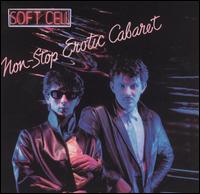 groundbreaking synthpop/New Wave duo Soft Cell, released in 1981 by Some Bizarre Records. The album's critical and commercial success was bolstered by the worldwide success of its single Tainted Love, a cover version of a little-known R&B song by Gloria Jones which topped charts worldwide and became the best-selling British single of 1981 in the United States. The album continued to produce a string of Top-5 singles in the UK, including "Bedsitter," "Torch," and the unapolagetically sentimental "Say Hello, Wave Goodbye."
groundbreaking synthpop/New Wave duo Soft Cell, released in 1981 by Some Bizarre Records. The album's critical and commercial success was bolstered by the worldwide success of its single Tainted Love, a cover version of a little-known R&B song by Gloria Jones which topped charts worldwide and became the best-selling British single of 1981 in the United States. The album continued to produce a string of Top-5 singles in the UK, including "Bedsitter," "Torch," and the unapolagetically sentimental "Say Hello, Wave Goodbye." Despite many the reputation of many New Wave bands as being on the cutting edge of technology, the album was created on a very low budget; it was supposedly recorded almost entirely with a Revox tape recorder, a borrowed Roland drum machine belonging to Kit Hain, a small, preset Roland bass synthesizer, and an NED Synclavier, the first commercially available digital synthesizer, belonging to producer Mike Thorne. The album was recorded in New York City at the height of its gay club scene, at a time which the drug MDMA (also called ecstasy) was just beginning to become popular. The sound and club beats of the album reflect this atmosphere, with songs about pornographic cinemas and infidelitrous relationships. The group caused some controversy in the UK over the single "Sex Dwarf," the video of which was banned for explicit, S&M-related content. The duo would delve deeper into its fascination with decadence on its subsequent works, including the 1982 remix album Non-stop Ecstatic Dancing, which features an alternate cut of "Sex Dwarf" on which singer Marc Almond, famous for his flamboyant, unabashed homosexuality, appears to simulate a female orgasm with his voice. This may be why they were never able to recapture the success of their premiere with their later works.
Soft Cell were and are, in some ways, more famous for their singles than for their full-length albums. Many of their most acclaimed songs (including "Torch" and "Where Did Our Love Go?") do not appear on their LP releases. An example of this is "Tainted Love," which, when originally recorded, was over eight minutes long due to the fact that it gradually segued into "Where Did Our Love Go?" After it was recorded, the session was split into two different songs, with "Where Did Our Love Go?" only being listenable as the B-side to "Tainted Love" or on the full eight-minute cut, which was sold as a 12-inch single. As a result, many of their singles have become quite valuable. Their first release, the single "Memorabilia" b/w "A Man Could Get Lost" may fetch prices as high as $85 (approximately £50), due to the fact that the original version was for many years unavailable on CD (although a remix appears on their 1982 release "Non-stop Ecstatic Dancing").
The song "Frustration" also appears on the rare 1979 independently released EP, Mutant Moments, although the two versions are very different and contain slightly different lyrics. Remixes of several tracks, including "Sex Dwarf" and an instrumental cut of "Chips On My Shoulder" also appear on the remix album, Non-stop Ecstatic Dancing.
Sunday, October 02, 2005
Eric Clapton - Eric Clapton
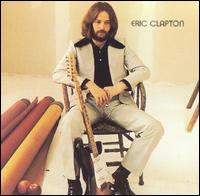 completed a tour with Delaney & Bonnie. Clapton used the core of the duo's backing band and co-wrote the majority of the songs with Delaney Bramlett -- accordingly, Eric Clapton sounds more laid-back and straightforward than any of the guitarist's previous recordings. There are still elements of blues and rock & roll, but they're hidden beneath layers of gospel, R&B, country, and pop flourishes. And the pop element of the record is the strongest of the album's many elements -- "Blues Power" isn't a blues song and only "Let It Rain," the album's closer, features extended solos. Throughout the album, Clapton turns out concise solos that de-emphasize his status as guitar god, even when they display astonishing musicality and technique. That is both a good and a bad thing -- it's encouraging to hear him grow and become a more fully rounded musician, but too often the album needs the spark that some long guitar solos would have given it. In short, it needs a little more of Clapton's personality.
completed a tour with Delaney & Bonnie. Clapton used the core of the duo's backing band and co-wrote the majority of the songs with Delaney Bramlett -- accordingly, Eric Clapton sounds more laid-back and straightforward than any of the guitarist's previous recordings. There are still elements of blues and rock & roll, but they're hidden beneath layers of gospel, R&B, country, and pop flourishes. And the pop element of the record is the strongest of the album's many elements -- "Blues Power" isn't a blues song and only "Let It Rain," the album's closer, features extended solos. Throughout the album, Clapton turns out concise solos that de-emphasize his status as guitar god, even when they display astonishing musicality and technique. That is both a good and a bad thing -- it's encouraging to hear him grow and become a more fully rounded musician, but too often the album needs the spark that some long guitar solos would have given it. In short, it needs a little more of Clapton's personality.
Soft Cell 3
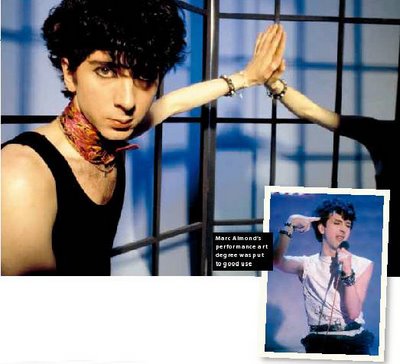 Soft Cell emerged from the twin backgrounds of Leeds Art College and Northern soul. Though first andforemost soulboys, they didn’t meet on the dancefloor but in a classroom at the aforementioned college where Marc was studying performance art on the same course,
Soft Cell emerged from the twin backgrounds of Leeds Art College and Northern soul. Though first andforemost soulboys, they didn’t meet on the dancefloor but in a classroom at the aforementioned college where Marc was studying performance art on the same course,coincidentally, as Indian rubber man Fad Gadget and David was just “fiddling about with synthesizers”.
Their performance training isn’t immediately apparent from their TOTP ‘Tainted Love’ show – David does the standing still quite well, while Marc twitches engagingly through a clumsy set of extravagant gestures barely in sync with the rods – but it was a valuable grounding.
“It instilled in us the need to be independent,” recalls
Marc, “because the course we were doing consisted of being put into a big studio with all these facilities and then being told: ‘Right whatever you do, go ahead and do it. It’s all up to you and you’ve got three years to make something out of it.’”
Marc performed, David produced the soundtrack.What they did then isn’t relevant now, says David. Marc,more helpfully, expands.
“For me, my performance art background is only important because it gave me the confidence to get out there onstage. It was just, like, exercising myself in getting up onstage and not caring if I make a fool of myself. After that, it’s just a case of looking back on things you did three years ago and feeling a little red faced about them, if only because your ideas improve a lot in the meantime.”
More telling is their apprenticeship in Northern teen disco – not the sophisticated clubs where the DJ plays a never-ending stream of jazz funk imports from New York that nobody recognises or indeed would bother taking home with them. Their roots in a poppier dance, in the tunes that occasionally make the charts;‘Tainted Love’ is their tribute to the teen dance.
“We both like Northern soul, ’60s music and the 12-inch record,”explains Marc. “We thought we would try to being that ’60s sound and style of song into the ’80s, but the problem was to how to do a 12-inch of ‘Tainted Love’ without doing the boring, very standard thing of stripping it all down to the bass and drums and re-editing the sound, which is putting me off 12-inches in a way.
“Then we had the idea of doing an instrumental bit in the middle and going into another song at the end, almost like a medley tribute to where we come from, those songs that made an impression on us. It was originally just going to include a few bars of ‘Where Did Our Love Go’ but we liked the way it turned out and included the whole song.
“And we even had a slightly tongue-in-cheek drum break in the middle – that’s the crashing of dustbin lids and syn-drums.”
Before talking to Soft Cell, it was easy to think that the radical leap in quality from the earlier ‘Memorabilia’’s Suicide-madepainless to the distinctive torch reading of ‘Tainted Love’ was more down to producer Mike Thorne than the duo. The wonderful segue,for instance, is a disco producer’s trademark. However, it becomes apparent that it was the duo who went in with the ideas and Thorne made them work. It wasn’t the production of ‘Memorabilia’ that was at fault, but the song itself. The duo still quite like it, though they acknowledge the sound improvements of their hit.
“We had liked Mike Thorne’s production of Wire,” says Marc,“and anyway he is a less obvious choice of producer than Daniel Miller (the Mute man who produced ‘Memorabilia’) for electronic
music, we’re very pleased the way things have turned with Mike and we’re going to New York soon to record a new single and LP with him.”
‘Tainted Love’ could mark the beginning of the end of their longstanding love affair with disco. Being a Friday night DJ at Leeds Warehouse, Marc Almond is fully aware of all its trends and innovations, its emotions and fl uctuations. But these days its appeal is wearing thin.
“You can’t go on forever on the dancefl oor,” admits Marc ruefully. “There is still some great disco coming out, but it’s coming to wear a little thin on me. I hate this new Latin music,
though the real Latin music is great. I mean, how can people who have no roots in Puerto Rico bring out this kind of music?”Disillusioned with the dancefl oor, where do you turn to from
here, Marc?
“To the bedroom, I think,” he giggles. “It’s getting to the stage where we’ve said what needs to be said about that, about going out and having fun… and then come the tears.
“Our writing is getting more personal, a bit deeper and a lot sadder. It’s about reaching into the stuff and writing things that you have to feel about.”
Soft Cell are one of the few units who have a genuine claim on the new cabaret, even if there is as much Batley Variety Club as the Berlin kind. Their entertainment is effusively emotional in
the showbiz tradition, ridiculously expressive, mildly satirical/ comical and hilariously self-indulgent. And in the best tradition of Northern variety it’s also a little grubby. For reasons known only to themselves, they’ve taken to having publicity shots done in sex shops with peculiar props.
David: “We like people to think that there is something shady or seedy in our backgrounds that nobody knows anything about.”
Have you?
“We’re not saying!”
“We’re not interested in being clean and goody-goody,”explains Marc. “ We like writing songs about sex and trash. We did that consciously to get a dirtier image really. The LP will be
called ‘Non-Stop Erotic Cabaret’.”
“We got one song from a News Of The World headline ‘Sex Dwarf Lures 100 Disco Dollies To A Life Of Vice’,” he laughs. “We felt it just had to be put down and immortalised.”
To the people who have to sell them Soft Cell are depressingly diffi cult to pin down.
“People tell us that we’re directionless,” admits Marc. “Well,if I had a plan and knew what I would be doing in three years I wouldn’t bother. It’s more exciting to be directionless – this it
the perfection that we’re aiming towards. We want to be aware of everything – people’s feelings, the media, trivia, deepness, everything! And if that’s being dilettante and directionless than
I am dilettante and directionless… and glad!”
Taken from Nme original 80s
Saturday, October 01, 2005
Eric Clapton Biography
 By the time Eric Clapton launched his solo career with the release of his self-titled debut album in mid-1970, he was long established as one of the world's major rock stars due to his group affiliations -- the Yardbirds, John Mayall's Bluesbreakers, Cream, and Blind Faith -- affiliations that had demonstrated his claim to being the best rock guitarist of his generation. That it took Clapton so long to go out on his own, however, was evidence of a degree of reticence unusual for one of his stature. And his debut album, though it spawned the Top 40 hit "After Midnight," was typical of his self-effacing approach: it was, in effect, an album by the group he had lately been featured in, Delaney & Bonnie & Friends.
By the time Eric Clapton launched his solo career with the release of his self-titled debut album in mid-1970, he was long established as one of the world's major rock stars due to his group affiliations -- the Yardbirds, John Mayall's Bluesbreakers, Cream, and Blind Faith -- affiliations that had demonstrated his claim to being the best rock guitarist of his generation. That it took Clapton so long to go out on his own, however, was evidence of a degree of reticence unusual for one of his stature. And his debut album, though it spawned the Top 40 hit "After Midnight," was typical of his self-effacing approach: it was, in effect, an album by the group he had lately been featured in, Delaney & Bonnie & Friends.Not surprisingly, before his solo debut had even been released, Clapton had retreated from his solo stance, assembling from the D&B&F ranks the personnel for a group, Derek and the Dominos, with which he played for most of 1970. Clapton was largely inactive in 1971 and 1972, due to heroin addiction, but he performed a comeback concert at the Rainbow Theatre in London on January 13, 1973, resulting in the album Eric Clapton's Rainbow Concert (September 1973).
But Clapton did not launch a sustained solo career until July 1974, when he released 461 Ocean Boulevard, which topped the charts and spawned the number one single "I Shot the Sheriff."
 The persona Clapton established over the next decade was less that of guitar hero than arena rock star with a weakness for ballads. The follow-ups to 461 Ocean Boulevard, There's One in Every Crowd (March 1975), the live E.C. Was Here (August 1975), and No Reason to Cry (August 1976), were less successful. But Slowhand (November 1977), which featured both the powerful "Cocaine" (written by JJ Cale, who had also written "After Midnight") and the hit singles "Lay Down Sally" and "Wonderful Tonight," was a million-seller. Its follow-ups, Backless (November 1978), featuring the Top Ten hit "Promises," the live Just One Night (April 1980), and Another Ticket (February 1981), featuring the Top Ten hit "I Can't Stand It," were all big sellers.
The persona Clapton established over the next decade was less that of guitar hero than arena rock star with a weakness for ballads. The follow-ups to 461 Ocean Boulevard, There's One in Every Crowd (March 1975), the live E.C. Was Here (August 1975), and No Reason to Cry (August 1976), were less successful. But Slowhand (November 1977), which featured both the powerful "Cocaine" (written by JJ Cale, who had also written "After Midnight") and the hit singles "Lay Down Sally" and "Wonderful Tonight," was a million-seller. Its follow-ups, Backless (November 1978), featuring the Top Ten hit "Promises," the live Just One Night (April 1980), and Another Ticket (February 1981), featuring the Top Ten hit "I Can't Stand It," were all big sellers.Clapton's popularity waned somewhat in the first half of the '80s, as the albums Money and Cigarettes (February 1983), Behind the Sun (March 1985), and August (November 1986) indicated a certain career stasis. But he was buoyed up by the release of the box set retrospective Crossroads (April 1988), which seemed to remind his fans of how great he was. Journeyman (November 1989) was a return to form.
It would be his last new studio album for nearly five years, though in the interim he would suffer greatly and enjoy surprising triumph. On March 20, 1991, Clapton's four-year-old son was killed in a fall. While he mourned, he released a live album, 24 Nights (October 1991), culled from his annual concert series at the Royal Albert Hall in London, and prepared a movie soundtrack, Rush (January 1992). The soundtrack featured a song written for his son, "Tears in Heaven," that became a massive hit single.
In March 1992, Clapton recorded a concert for MTV Unplugged that, when released on an album in August, became his biggest-selling record ever. Two years later, Clapton returned with a blues album, From the Cradle, which became one of his most successful albums, both commercially and critically. Crossroads 2: Live in the '70s, a box set chronicling his live work from the '70s, was released to mixed reviews. In early 1997, Clapton, billing himself by the pseudonym "x-sample," collaborated with keyboardist/producer Simon Climie as the ambient new age and trip-hop duo T.D.F. The duo released Retail Therapy to mixed reviews in early 1997.

Clapton retained Climie as his collaborator for Pilgrim, his first album of new material since 1989's Journeyman. Pilgrim was greeted with decidedly mixed reviews upon its spring 1998 release, but the album debuted at number four and stayed in the Top 10 for several weeks on the success of the single "My Father's Eyes." In 2000, Clapton teamed up with old friend BB King on Riding With the King, a set of blues standards and material from contemporary singer/songwriters. Another solo outing entitled Reptile followed in early 2001. Three years later, Clapton issued Me and Mr. Johnson, a collection of tunes honoring the Mississippi-born bluesman Robert Johnson. 2005's Back Home, Clapton's 14th album of original material, reflected his ease with fatherhood.
SOFT CELL
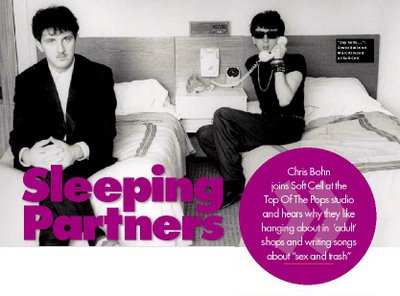 Soft Cell have absorbed their lessons well. ‘Tainted Love’ – once a Northern disco hit for Marc Bolan’s wife Gloria Jones – is one of the most assured and stunning syn-ful dance singles released this year. In its combination of streamline software simplicity and sensual throb it reinforces NY heroes Suicide’s experiments in emotion-tugging electronics without repeating them directly,as they had done previously with the earlier ‘Memorabilia’.
Soft Cell have absorbed their lessons well. ‘Tainted Love’ – once a Northern disco hit for Marc Bolan’s wife Gloria Jones – is one of the most assured and stunning syn-ful dance singles released this year. In its combination of streamline software simplicity and sensual throb it reinforces NY heroes Suicide’s experiments in emotion-tugging electronics without repeating them directly,as they had done previously with the earlier ‘Memorabilia’.They’ve taken the whole thing a step further on the 12-inch version, which effortlessly merges with the B-side version of The Supremes’ ‘Where Did Our Love Go’ via an extremely inventive,
melodic burn down. Little touches like that contribute to ‘Tainted Love’’s transcendence of genre prejudices. They elevate it, and by implication the whole electro-bop, above the fickle clutches of the fad fiends and place it in the public arena where it belongs.
Nobody should be surprised, hurt or disappointed that Soft Cell are sitting pretty at the top of the BBC charts.
A lone, Latin-tinged trumpet sounds through the corridors and seeps all off-key into Soft Cell’s dressing room. The duo makes an odd couple. “It wasn’t planned that way,” they assure me.
Singer Marc Almond, from Southport, is small, effervescent and giggly; musician David Ball, from Blackpool, is tall, laconic,almost morose and more conscientiously artisan than artist.
Unsurprisingly Marc dominates the conversation.
“There,” he sighs. “I’ve gone and hogged the interview again.”
Marc plays frontman with relish – all Liberace gestures and varying voice pitches while David is the natural straightman who is still wondering what all the fuss is about. What with the former’s
flutterings and the latter’s refusal to participate in the creation of the Soft Cell myth, the duo were at fi rst dismissed as flightly futurists prepared to ride whatever bandwagon was available.
The first one to happen along was the ‘Some Bizzare Album’ compilation put together by East End futurist DJ and lovable pest Stevo. When it came out, the Some Bizzare boys were seen
as poor relations to the more stylish publicists of the Spandau Ballet/Rusty Egan set. Stood up against Spandau svengali Steve Dagger, or even Blue Rondo’s Chris Sullivan, Stevo appeared as
little more than a court jester.
However, as Spandau and Blue Rondo’s attempts to stay ahead have resulted in increasingly absurd fads, the unforced emergence of one-time Bizzare groups Depeche Mode and Soft Cell sets the whole operation in a far better light. Compare, for instance,Spandau Ballet’ degeneration from kitschy visionaries into hack funk plagiarists with Soft Cell’s rise from trashy aesthetes to
dancehall favourites and decide for yourselves who’s created the New Soul Version. Suddenly it becomes apparent that Stevo was closer to the pulse than the rest.
“Stevo has been knocked an awful lot,” states Marc. “He’s been called all sorts of things. Paul Morley said, which was really untrue, that ‘Some Bizzare…’ was a nice sort of home for all these
little groups that nobody wanted. Well, I admire Stevo for going out to be untrendy, for turning down groups who were already well known and who were prepared to be on the album,accepting
the ‘futurist’ tag and all.”Read last page...
Contact
Popular Posts of the Week
-
History They originally called themselves The Reactionaries , with additional band member and singer Martin Tamburovich. According to Watt, ...
-
Electronic, jazz, rock and pop combo from Everything But The Girl. First three song Walking Wounded, Single and Wrong make you think that yo...
-
Wishing On A star Paul Weller Beautiful Boyz Cocorosie Santa Maria Da Feira Devendra Banhart Show girl The Auteurs Mint Car ...
-
Octavarium is the eighth full-length Dream Theater studio album, released on June 7, 2005 (see 2005 in music).It holds the distinction of b...
-
01. Love Will Tear Us Apart 02. Ian Curtis Interview 03. Leaders Of Men 04. Steve Morris & Ian Curtis Interview 05. Failures 06. Ian Cur...
-
Track 01 I Bet That You Look Good On The Dancefloor * (5.3MB) Track ...
-
Flaming Lips 1986-2006 Interesting little collection of live tracks and rarities from the Lips. Actually, only three of these tracks are not...






